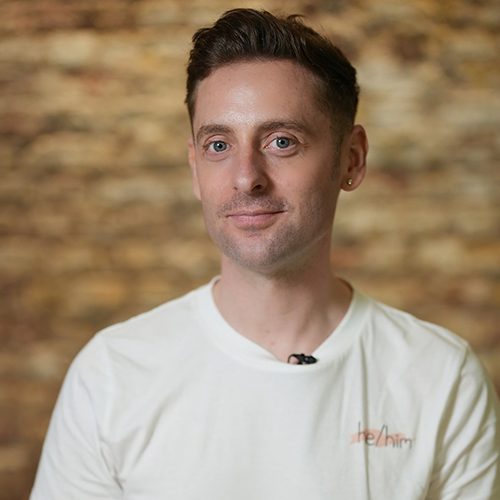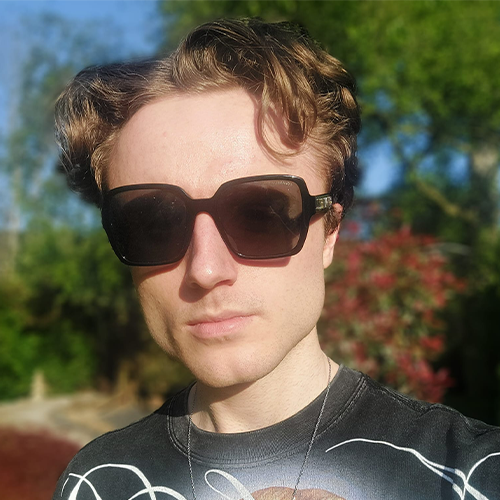Sex education charity head and patron warn of ‘scary’ slide back to Section 28
Exclusive: "We talk about consent, we talk about sexual health, and if it's restricted then you're affecting people's lives in a way that could endanger them," says Sexpression UK spokesperson Daniel Harding

Is there anyone who had to sit through sex education classes at school who didn’t find it at least a little bit awkward? Especially if you’re LGBTQ+. In this writer’s experience, sex education was very good at informing the heteros about what they needed to do and be aware of but not so much for the gays. The only time gay men were mentioned was the entirely predictable anal sex joke.
This is why Sexpression UK, a near-peer independent charity in the UK that is working to empower young people when it comes to relationships and sex, is of vital importance, especially in the context of rising STI rates in England. Established in 2000 the group now operates across the UK from Aberdeen to Exeter. There are yet to be branches in Northern Ireland and Wales. Minus a board of trustees, the organisation is entirely led by university students. The goal being that this reduced age gap, plus an informal manner, will make relationships, sex, and health education (RSHE) a lot more effective.
“We’re focused on trying to deliver stuff that is relevant to young people and doing it in a way that is accessible and doesn’t feel preachy or awkward because young people don’t respond well if it’s delivered in a poor way,” explains Sexpression UK’s National Director, Jack Liepa. He got involved after his own sex education classes failed to properly address the needs of LGBTQ+ people like himself. He joined Sexpression UK as a student at Lancaster University, becoming its branch manager and leading a campaign to introduce mandatory consent education, which took him into the executive side of things.
“The only education that I ever had was porn and that’s not a great education” – Daniel Harding
Everything the charity teaches is in line with the UK government’s statutory guidance on RSHE. It’s LGBTQ+ inclusive and also informed by guidance from the PSHE Association, Sex Education Forum, as well as the UNESCO technical guidance on comprehensive sexuality education. In free bespoke sessions, Sexpression UK’s volunteers cover six themes – bodily changes, sex and the media, contraception and sexually transmitted infections, sexual orientation and gender identity, healthy relationships and abuse, and finally, sex and consent.
Part of the appeal of Sexpression is the ‘near-peer’ side of things. As the people leading the sessions (who have gone through extensive training) are close in age to the people they’re addressing, the charity has found that’s helped impart key knowledge. Jack describes the tone as “not overly stuffy” meaning informal but with proper terminology. Young people are treated like adults. As per Sexpression UK’s 2023/24 academic mid-year report, 72% of people agreed or strongly agreed they had learned something. 85% agreed or strongly agreed sessions had been delivered well. 83% of respondents wanted more Sexpression UK sessions. The results speak for themselves.

Author Daniel Harding has recently joined Sexpression UK as a spokesperson and patron. In his debut book Gay Man Talking: All the Conversations We Never Had he encouraged queer people to continue talking about important topics like sex. Linking up with Sexpression UK was a no-brainer.
“Growing up sex scared me. Even when I came to terms with the fact that I am a gay man, I still was scared,” he recalls of his own experiences at school. “The only education that I ever had was porn and that’s not a great education.” A recent poll found that of 1,001 young people 15% said their main source of information on sex was pornography.
“Most people are quite engaged and maybe they’re not necessarily informed, but they are quite willing to learn” – Sexpression UK’s Jack Liepa
Daniel’s goals are aligned perfectly with Sexpression UK in wanting to provide valuable education as well as correct myths and misinformation which are easy to come by in the digital age. “I assumed, growing up, that if I didn’t wear a condom, I would get HIV,” Daniel continues. “That’s the mentality [at school].”
Jack’s experience with Sexpression UK is evidence of the prevalence of misinformation online. “There is a lot of misinformation out there. One of the things we are coming up against a lot is misogynist influencer-inspired content.” No prizes for who he’s referencing there. “I think that is more prevalent than it was two or three years ago,” he goes on to say adding there is also still some pushback on LGBTQ+ content. “But on the whole, most people are quite engaged and maybe they’re not necessarily informed, but they’re willing to learn,” he shares. Elaborating on the pushback when it comes to LGBTQ+ content, Jack says it’s still seen as an “ideology” being imposed on young people. In addition to homophobic and transphobic bullying, Jack says shows that “LGBTQ+ education is still very needed.”

Generally, when it comes to pushback to their sessions, Sexpression UK has been lucky. While other companies providing LGBTQ+ inclusive education have come up against uninformed reporting in the media and anger from misunderstanding parents, Sexpression UK has been “very fortunate.” Jack cites their longstanding relationships with schools plus their clear communication as reasons for this. Ultimately, it’s often schools who approach Sexpression UK, so questions are rightly directed at schools. Content is also age-appropriate Jack stresses.
“Giving this education to people, you’re going to make their lives better, keep them safe, and make them more comfortable” – Daniel Harding
Still, the discourse among some politicians and in the media indicates a move to question sex education, regardless of who is providing it. In the face of a review of RSHE by the Department for Education, Jack says Sexpression UK is not worried. “We’re rigorous in our quality assurance and our training, and our adherence to what the government says.” However, he is worried what such a review could mean when it comes to what content is considered appropriate.
“We recently had a debate about LGBTQ+ inclusion in the curriculum in Westminster, and it does seem to be a return back towards section 28.” He references the piece of legislation brought in by Margaret Thatcher which prohibited the ‘promotion of homosexuality’ in schools between 1988 and 2003. “There’s still a pervasive belief that LGBTQ+ things are inappropriate for some reason and just saying that those with different families is somehow more sexual than saying the same thing but if you substitute it for heterosexual, that does worry me.”
Daniel agrees. “It’s quite scary. People need to access this information and the fact that we could go backward especially where this information is protecting people. We talk about consent, we talk about sexual health, and if it’s restricted then you’re affecting people’s lives in a way that could endanger them.” Daniel believes had he had better RSHE education at school he would have been able to come to terms with his sexuality much earlier than he did. “Giving this education to people, you’re going to make their lives better and keep them safe. Ultimately, sex is a great thing and we need to learn about every aspect of it so that we can feel comfortable.”
